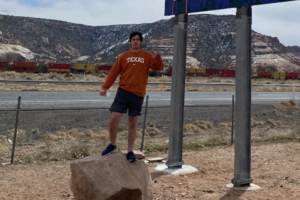Just Call Me By My Name: UT Students Reflect on Their Identity
By Jennifer Errico
Reporting Texas
A name is the first glimpse into a person’s character. It, too, is one’s brand.
Names correlate with self-worth, personality and status. According to author Ralph Ellison, it is through our names how we first place ourselves in this world.
Three University of Texas at Austin students share how their names shaped their identities, often not without struggle.
Abhirupa Dasgupta
“Abhirupa!” a high school classmate called out, trying to get Abhirupa Dasgupta’s attention in Biology. No response.
“Abhirupa,” he yells again. Still no response.
“Abhirupa,” he calls one more time as he pokes her shoulder. She immediately turns.
“Did you not hear me calling, Abhirupa?” He asked. Shivers shot through her veins as “Abhirupa” reverberated in her ear canal. She hadn’t heard that name in seven years.

Abihirupa Dasgupta
Unable to pronounce the name “Abhirupa,” a third-grade teacher assigned the anglicized name “Abby” to her. From elementary to college, she was known as Abby.
“Looking back, it’s a little problematic,” Dasgupta said. “Growing up now, there’s more emphasis on cultural sensitivity, but I just missed it. I went by Abby to make everything easier.”
Dasgupta said her name change in society didn’t affect her family relationships because she’s called “Manu” at home.
“It’s a sweet tradition in our culture where you have your given name, your government name that everyone calls you, but then your family name,” Dasgupta said. “Only the people that really love me and people who are a part of my community call me (Manu), so it’s nice to have something separate. Something just for my family.”
Dasgupta is the eldest in her family and is named after her father.
India is a patriarchal society where sons are prioritized over daughters, so Dasgupta said her father naming her after him is a token of appreciation and acceptance.
“He never made me feel less than,” Dasgupta said. “He always says he’s really lucky to have daughters and I’m very lucky I didn’t ever have to feel guilty or ashamed of my gender.”
The neuroscience senior is now transitioning back to her full name as she enters medical school.
“It means a lot to (my parents) that I’m going to be a doctor, and (Abhirupa) is the name my parents gave me, so I want to honor them by using it,” Dasgupta said.
Dasgupta said she felt authentically herself, whether she was called Abhirupa or Abby. However, going by Abhirupa makes her feel more connected to her family.
“I am so lucky to have my family’s unconditional love and support, and my name means a lot to them,” Dasgupta said. “My identity as their daughter or as a granddaughter is tied to Abhirupa.”
Katka Durcanska
When meeting new people, Katka Durcanska introduces herself as “Vodka but with a K.”
The Slovak native says without that comparison, people will call her Katia, Cat-ka, or Katherine.
Durcanska’s full name is Katarina, a prevalent Slovakian name. The name, Katka, is the given nickname for Katarina and is used as a child’s pet name. Durcanska said Katarina felt too American, so she continued to go by Katka throughout adulthood.
The name Katka, she said, connects her to her roots.
“It’s a very unique name, and not anyone here has a name like it,” mechanical engineering senior Durcanska said. “People know that I’m from somewhere else just by my name, which I like.”
Durcanska was born in America but said her household felt like a sliver of Slovakia in Plano, Texas.
“My name contributes to my home. It makes me feel foreign,” Durcanska said. “I always say I feel 100% Slovak and 100% American, but my name ensures I don’t lose that Slovakian side even when I’m in America.”

Katka Durcanska
Although thrilled by her name’s uniqueness, she still hates having to explain it to people. Durcanska said she loathes when people mispronounce it or shorten it to Kat
.Durcanska said she understands her name is hard to say and appreciates it when people clarify how to pronounce it.
“I don’t mind repeating my name over again; I mean, I love saying my name,” Durcanska said. “I appreciate when people ask because it feels like they care and actually want to get to know me.”
Durcanska said her name connects her with her siblings because they also have Slovakian names. The three of them standing out unites them as a family.
“(My name) makes me feel happy,” Durcanska said. “It’s more than just a name. It’s my family, my origins, and my country.”
Mateo Ortega
At his dorm dining hall in Jester, Mateo Ortega and his friends discussed what they would name their children.
Names such as Miley, Xavier and Toby went around the circle. At that moment, Ortega realized he needed a race-neutral name for his child.
“I wouldn’t feel comfortable naming my kid Zach Ortega or Weston… that’s disgusting. It doesn’t sound right,” said the mechanical engineering junior. “I would have to call my kid a name that’s the same in Spanish and English, such as Daniel.”
Ortega said he and other Hispanic individuals have a dilemma where they butcher their name due to saying it the English way.
“It’s annoying pronouncing (my name) in front of my parents because they get offended when Spanish names are anglicized,” Ortega said. “But I personally don’t care if people pronounce it the ‘American way.’ ”

Mateo Ortega
The name Mateo is common in romantic languages such as Italian, Portuguese and Spanish. The English translation is Matt and Ortega said it would be easier if he used the American name.
Ortega believes his name hinders him from job opportunities.
“Based on my name, I either have to prove myself as being American enough, or I feel like they hire me for a diversity quota and expect me to fit a certain role (like the) poster boy Latino,” Ortega said. “When I don’t fit that mold, it’s almost as if these companies are offended.”
Ortega said he often jokes he won’t get a job in finance because nobody would trust someone who shares the name with branded taco sauces such as “Mateo’s Gourmet Salsa” or “Ortega Thick and Chunky Salsa.”
Ortega said the mispronunciations and stereotypes that arise from his name don’t bother him.Ultimately, he said his name doesn’t define him but instead defines his name. Among his friends, his name has become an adjective.
“They’ll be like, ‘That’s so Mateo,’ or ‘Did you just get Mateoed?’ ” Ortega said. “I think it’s funny and a tribute to my personality. If anything, it makes me like my name more. I wouldn’t want to change it.”